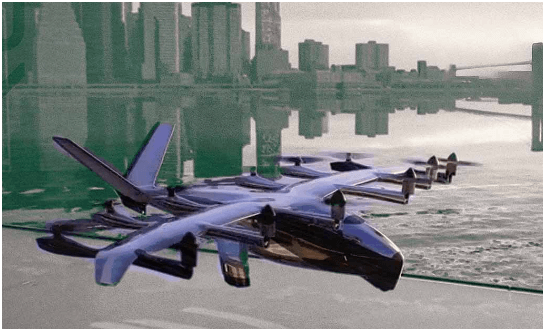Dubai-based firm has announced the purchase of 10 electric flying cars, marking a significant step in launching an air taxi service.
This development underscores the city’s ambition to lead in innovative transportation solutions and aligns with its vision of becoming a global hub for advanced technologies.
The firm, which remains unnamed for now, revealed its plans during a press conference held at a major technology expo in Dubai. The announcement has generated considerable excitement and curiosity, as it promises to revolutionize the way people commute in urban environments. The electric flying cars, designed by a leading aerospace company, are equipped with cutting-edge technology, ensuring safety, efficiency, and sustainability.
These flying cars are powered by electric propulsion systems, making them an environmentally friendly alternative to traditional gasoline-powered vehicles. They are designed to take off and land vertically, similar to helicopters, which allows them to operate in densely populated urban areas without the need for extensive infrastructure. The vertical takeoff and landing (VTOL) capability is expected to make air taxis a viable option for short-distance travel, significantly reducing commute times and easing traffic congestion.
The Dubai firm’s decision to invest in electric flying cars is part of a broader strategy to integrate advanced transportation technologies into the city’s infrastructure. This initiative is supported by the Dubai government, which has been actively promoting innovation and sustainable development. The air taxi service is anticipated to complement Dubai’s existing transportation network, providing residents and tourists with a fast, convenient, and eco-friendly mode of transport.
The electric flying cars, which can carry up to four passengers, are equipped with autonomous navigation systems, allowing them to operate without a pilot. This autonomous capability is expected to enhance safety by reducing the potential for human error. The vehicles are also equipped with advanced sensors and communication systems, enabling them to navigate complex urban environments and avoid obstacles.
The introduction of air taxis in Dubai is expected to have a transformative impact on the city’s transportation landscape. It promises to offer a swift alternative to road travel, particularly during peak traffic hours, thereby enhancing overall mobility. Moreover, the use of electric flying cars aligns with Dubai’s commitment to reducing carbon emissions and promoting sustainable urban development.
The firm’s acquisition of the electric flying cars marks the beginning of a comprehensive rollout plan. Initially, the air taxi service will be launched on a trial basis, with select routes connecting key locations in the city. During this phase, the firm will collaborate with regulatory authorities to ensure compliance with aviation safety standards and to address any operational challenges. If successful, the service will be expanded to cover more routes, with the potential to integrate with other forms of public transportation.
This initiative has been met with enthusiasm from various stakeholders, including government officials, urban planners, and environmental advocates. The introduction of air taxis is seen as a forward-thinking solution that addresses multiple urban challenges, from traffic congestion to air pollution. It also positions Dubai as a pioneer in the adoption of advanced transportation technologies, setting a precedent for other cities around the world.
However, the deployment of air taxis also presents several challenges that need to be addressed. Ensuring the safety and reliability of the service is paramount, and the firm is expected to invest heavily in rigorous testing and maintenance protocols. Additionally, the regulatory framework for urban air mobility is still evolving, and the firm will need to work closely with aviation authorities to develop comprehensive guidelines and standards.
The high cost of developing and operating electric flying cars is another consideration. While the initial investment is substantial, the firm is optimistic that the long-term benefits, including reduced traffic congestion and lower emissions, will justify the expenditure. The company also anticipates that advancements in technology and economies of scale will gradually reduce costs, making air taxi services more accessible to a broader population.
In conclusion, the purchase of 10 electric flying cars by a Dubai firm represents a bold step towards realizing the vision of urban air mobility. This initiative is poised to transform the way people commute in Dubai, offering a fast, efficient, and eco-friendly alternative to traditional road transport. As the firm prepares to launch its air taxi service, it will need to navigate various technical and regulatory challenges. However, the potential benefits of this innovative transportation solution are immense, positioning Dubai at the forefront of global efforts to build smarter, more sustainable cities.
Stay Connected: ”Your Source for the Latest News Updates“





